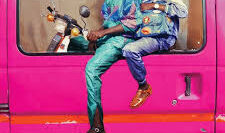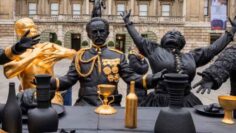Speak To Me Great Lionheaded Ancestors
Due to popular demand Fowokan George Kelly: Speak To Me Great Lionheaded Ancestors‘ @felixandspear London is being extended until 31 May. A self taught artist inspired by his ancestral history and culture of pre-colonial Africa and ancient Egypt..
Visit: https://www.felixandspear.com/fowokan
Kenness George Kelly, originally from Kingston, Jamaica, embarked on a transformative journey when he migrated to Britain in 1957, settling in Brixton, South London. It was during a trip to Benin, Nigeria, in the mid-1970s that he found his calling as an artist. His experience there sparked a spiritual awakening, leading him to return to London with a newfound determination to delve into sculpture. He took the name Fowokan from the Yoruba meaning “one who works with his hands”.
Unlike many artists of his time, Kelly consciously avoided formal training in Western institutions. He believed they couldn’t offer him the insights he sought into the art and culture of Africa. Instead, he pursued knowledge through books and hands-on experimentation, embracing trial and error as his teachers.
Traveling extensively throughout Africa, Kelly delved into the spiritual essence of his ancestral homeland, viewing it as his true art school and university. He became deeply immersed in the philosophical aspects of his craft, exploring the rich tapestry of ideas behind African art and culture. His insights were not confined to his sculptures; he also penned essays, contributing to the discourse on African art and spirituality.
Kelly’s contributions to the art world were recognized in various exhibitions and initiatives, including “Better than Good” in 2011 and “No Colour Bar: Black British Art in Action 1960–1990” in 2015–2016. Margaret Andrews chronicled his life and works in the biography “Becoming Fowokan,” published in 2022.
Central to Kelly’s artistic philosophy is his belief that African art transcends mere aesthetic expression; it encompasses religion, magic, and ritual. He sees art as a potent tool for redefining the contemporary African worldview and reclaiming narratives long silenced by colonialism.
His body of work reflects this ethos, ranging from naturalistic portraits to pieces inspired by African diasporic stories, like “The Lost Queen of Pernambuco.” Exhibited in prestigious venues worldwide, Kelly’s art has found its way into esteemed collections, including those of Harvard University and the National Portrait Gallery, London.
Through his art, Kelly invites viewers to see the world through fresh eyes, to engage with African aesthetics, and to hear the voices of ancestors speaking anew. His legacy extends beyond sculptures; it’s a testament to the enduring power of art in shaping cultural narratives and fostering understanding across boundaries.














